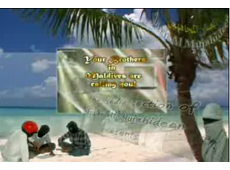Senior members of the Maldivian government yesterday met with 16 people arrested and sentenced for a violent protest against police at Himandhoo in North Ari Atoll in 2007, to discuss a reduction in their sentences under new clemency laws.
The inmates, currently imprisoned at Maafushi on sentences ranging from nine to 11 years, donned red motorcycle helmets and armed themselves with batons and knives to defend the Dhar al Khuir mosque on 6 October 2007. Police and soldiers were searching for suspects in the Maldives’ first Islamic terror investigation following a bomb blast in Sultan Park that injured 12 tourists.
The president’s Political Advisor Hassan Afeef, together with Special Envoy Ibrahim Hussain Zaki, Legal Affairs Secretary Hisaan Hussain and State Minister of Islamic Affairs Mohamed Saeed Ali Shaheem travelled to Maafushi jail to meet with the inmates to inform them that the president had made the decision to lessen their sentences.
Afeef said the government was unconvinced the group had received a fair trial under the former government, “and we don’t want anyone to undergo punishment for which they are not deserving.”

“The president wanted the inmates to know that people were going to criticise him over the decision, and for them to understand that their behaviour must be in line with the views of society when they are released,” Afeef said.
The conditions of their release had yet to be set, Afeef added. “That will come when the president gives the order,” he said, emphasising that “the government doesn’t take these decisions blindly. It studies the information and consults intelligence services, police and security forces.”
The president’s press secretary Mohamed Zuhair said the main reason leading to the stand off with police was not the terrorism investigation but the fact “they had started praying in their own mosque and their own homes”, an action not in line with the former government’s “single state Islam”.
“This government is against all froms of extremism religous or otherwise,” he said, claiming that the government’s “pluralist” approach and tolerance of other factions and preachers had led to better insight into the institutions operating in the Maldives.
“The president has always said that the way to avoid fundamentalism is more democracy,” Zuhair said, noting that “people join groups with good intentions.”
Pakistan dead
Earlier this week the government repatriated the remaining four of nine Maldivian nationals detained in Pakistan for alleged militant activities on the Pakistan border. The detainees were returned to their families as the Pakistan government placed no conditions on their release, although Foreign Minister Ahmed Shaheed announced yesterday the men would be kept under surveillance and their activities abroad investigated.
Zuhair also revealed that three other Maldivians, believed to have been part of the group, were killed while they were being transferred between facilities several weeks after their arrest following the Mumbai attacks in 2008.
“I believe they were being transferred from a facility when their convoy came under attack and the vehicle they were in hit a landmine,” Zuhair said.
“We had unconfirmed reports that they were the leaders of the Maldivian group, which may have been linked to the Lashkar-e-Taiba (LeT) currently waging war in Kashmir.”
Zuhair emphasised that the nine men who had returned had not been charged and were “innocent until proven guilty.”
“The political culture in the Maldives has changed,” he said. “Whereas before if the government was suspicious about someone they would be arrested and questioned, now people are innocent until proven guilty.
“I believe the government is keeping a close watch on these people,” he added.